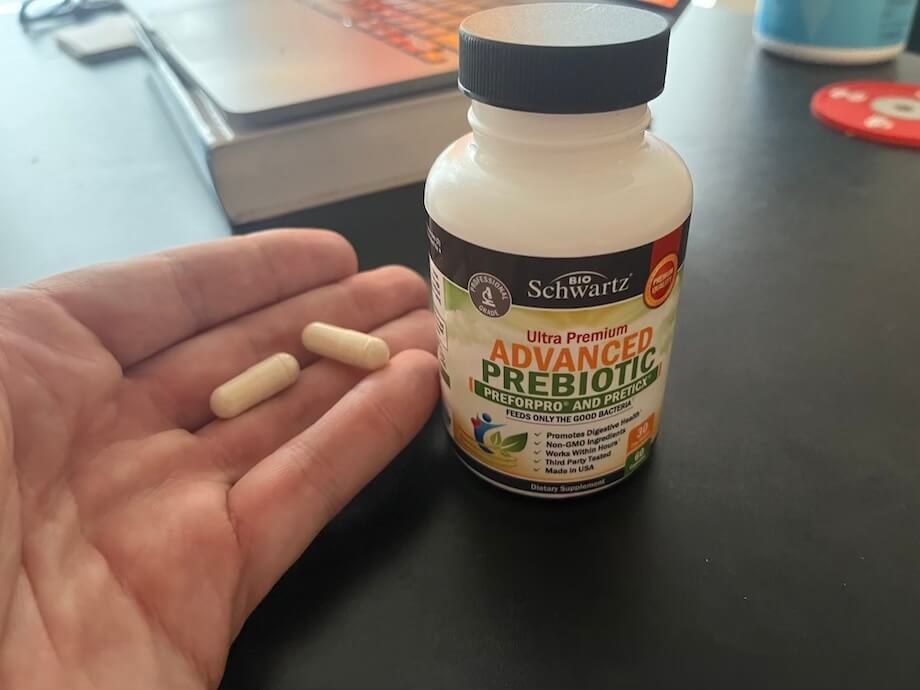Food fuels our bodies with essential nutrients, but digestion is not as simple as “Eat, rinse, and repeat” (or something like that). It’s a complex system that relies on digestive enzymes to break down food for effective nutrient absorption, allowing us to survive and thrive.
While your body makes digestive enzymes naturally, certain health conditions can negatively impact production, which is where supplements may come in. But adding these enzymes isn’t as straightforward as tossing back in a protein supplement to hit your daily targets—though some of the best protein powders sneak them in.
If you want to ensure you get the most out of your digestive system and leave no nutrients on the table, join me, a registered dietitian (RD), in this digestive enzymes guide. I’ll walk you through what digestive enzymes are, the most common types, who might need them most, their potential risks and benefits, and more.
Let’s break it down!
What Are Digestive Enzymes?
Digestive enzymes1 break down the food you eat so you can use them for energy and vital functions. Picture them as biochemical scissors, snipping the three macronutrients—carbohydrates, fats, and proteins—into smaller components to aid digestion and increase the bioavailability of essential nutrients.
RELATED: What Should My Macros Be?
The pancreas, a large gland behind the stomach, produces digestive enzymes released into the small intestine to help with digestion. Salivary glands in the mouth, stomach, and small intestine also play a role in enzyme production.

However, your body sometimes doesn’t produce enough digestive enzymes due to various health conditions, often those affecting the pancreas. Treating enzyme deficiency depends on the specific enzyme(s) involved and may include prescription or over-the-counter supplements.
Types of Digestive Enzymes
Your body is already hard at work producing digestive enzymes, but you can also find them in certain foods, supplements, and prescriptions. Let’s break them down (*wink*) and see what they do.
Body-Produced Digestive Enzymes
The pancreas2 produces three key enzymes to break down the macronutrients—carbs, fat, and protein:
- Amylase: Amylase breaks down complex carbs (starches) into simple sugars. However, resistant starches3—such as some veggies, grains, and legumes—cannot be digested by amylase and pass through the colon. Instead, they pass through to the colon, acting as prebiotics and nourishing beneficial bacteria (probiotics) to promote a healthy gut microbiome.
- Lipase: Lipase breaks fats into fatty acids and glycerol, aiding the digestion of foods like oils and butter. Without sufficient lipase, your body would struggle to absorb fat-soluble vitamins—A, D, E, and K—leading to potential deficiencies.
- Protease: Proteases, including trypsin and chymotrypsin, break the peptide bonds of protein foods into amino acids. Beyond digestion, proteases4 play crucial roles in DNA replication, cell growth, tissue repair, blood clotting, immune defense, and more.
Other enzymes produced by the gastrointestinal system—such as lactase, maltase, pepsin, and sucrase—also aid digestion.
Pro tip: If it ends in “-ase,” it’s likely an enzyme, and its name reveals its function. For example, amylase breaks down amylose (a type of starch), lipase digests lipids (fats), and protease targets proteins.
Food Sources of Enzymes
Certain foods provide digestive enzymes that may support your body’s digestive process, including:

- Bananas5: Rich in amylase, which helps break down carbohydrates.
- Kiwifruit6: Contains actinidin, a protease that aids in protein digestion.
- Mangoes7: Offer both amylase and invertase, enzymes that break down carbohydrates and convert sucrose into glucose and fructose.
- Papayas: High in papain, a protease8 that breaks down proteins.
- Pineapples9: Abundant in bromelain, a protease that also supports protein digestion.
Aside from supporting digestive health, these enzyme-rich foods may enhance overall wellness and play key roles in pharmaceuticals, food production, and cosmetics. For example, bromelain10 acts as a meat tenderizer and may reduce osteoarthritis symptoms—like swelling and pain—and muscle soreness.
Digestive Enzyme Prescriptions
Pancreatic enzyme replacement therapy11 (PERT) combines amylase, lipase, and protease to treat pancreatic exocrine insufficiency (PEI), also known as exocrine pancreatic insufficiency (EPI). This condition occurs when the pancreas doesn’t produce enough enzymes to digest carbs, fat, and protein from food properly.11
PERT options include enteric-coated formulations (such as Creon, Zenpep, Pancreaze, and Pertzye) and non-enteric-coated options (like Viokase). Since all PERT formulations are derived from pork, this may be a key consideration for those avoiding pork for dietary or religious reasons.
Over-the-Counter Digestive Enzyme Supplements
Over-the-counter (OTC) digestive enzymes don’t require a prescription and may contain either a single enzyme or a blend. These supplements typically target mild digestive discomfort or food intolerances.
For example, alpha-galactosidase12 can help people better digest galacto-oligosaccharides13 (GOS) in milk, legumes, and root vegetables. Individuals with lactose intolerance often take OTC lactase pills to help digest lactose found in milk and dairy products. However, we still suggest exploring the best dairy-free meal delivery for added convenience and nutrient diversity without the bloat.

Although over-the-counter enzyme supplements14 generally carry low risk, the Food and Drug Administration (FDA) doesn’t regulate dietary supplements. This lack of oversight raises the chances of contamination or incorrect dosing. To ensure safety, consult a healthcare professional who can guide you toward a reliable, third-party-tested product.
Digestive Enzyme Benefits
The main advantage of digestive enzymes is their boost to digestive health, though their benefits may extend to osteoarthritis, muscle soreness, and beyond:
- Treats pancreatic enzyme insufficiency, which helps reduce digestive discomfort while enhancing nutrient absorption, overall quality of life, and well-being11.
- Helps relieve food intolerances, including lactose intolerance.
- May manage various conditions of the digestive tract, including dyspepsia15 and irritable bowel syndrome16.
- May ease osteoarthritis symptoms by reducing pain and improving joint function14.
- May reduce muscle soreness, especially with protease enzymes, though more research is needed14.
Digestive Enzyme Side Effects and Safety
Pancreatic enzyme replacement therapy is widely regarded as both safe and effective for treating pancreatic exocrine insufficiency, while most OTC supplements pose minimal risk14. Still, digestive enzymes are not without potential side effects.
Whether taking a prescription like pancrealipase17 or an OTC supplement, some individuals may experience adverse reactions such as:
- Abdominal pain
- Allergic reactions
- Blood sugar fluctuations
- Bloating and gas
- Constipation
- Indigestion (dyspepsia)
- Diarrhea
- Dizziness
- Headaches
- Nausea
Additionally, digestive enzymes can interact with certain medications and reduce their effectiveness. For example, bromelain may interfere with amoxicillin and anticoagulant drugs14.
To prioritize safety when using digestive enzyme supplements or prescriptions, consult a healthcare professional to identify the most suitable and effective option for your needs. Always follow dosing instructions carefully, which often include swallowing capsules whole with food and liquid for best results.
Who Needs Digestive Enzymes?
Digestive enzymes are commonly prescribed for pancreatic exocrine insufficiency (PEI), a condition often linked to pancreatic disorders. Pancreatic enzyme replacement therapy (PERT) may be necessary for conditions such as:17
- Chronic pancreatitis, the leading cause of PEI, where ongoing inflammation damages the pancreas.
- Pancreatic cancer and tumors that block the pancreatic ducts.
- Surgeries involving the pancreas, stomach, or small bowel.
- Cystic fibrosis, which can obstruct the pancreatic ducts.
- Hereditary hemochromatosis, where iron deposits accumulate in the pancreas.
- Crohn’s disease, an autoimmune disorder that may disrupt enzyme production.
Properly managing pancreatic enzyme insufficiency is crucial, as untreated cases can lead to maldigestion and malabsorption. Although PERT is both safe and effective, it’s often underused or underdosed due to the challenging nature of diagnosing pancreatic enzyme insufficiency.
For this reason, PEI should be considered in patients with pancreatic disease risk factors or chronic, unexplained diarrhea. Other common signs include mild abdominal discomfort, bloating, cramping, and increased flatulence. In more advanced cases, severe symptoms may occur—like weight loss and steatorrhea (loose, greasy, foul-smelling stools that float and are difficult to flush)11.

Over-the-counter enzyme supplements may also help with other digestive issues, like lactose intolerance.
Still, consult a healthcare provider before taking digestive enzymes, especially if you’re managing a health condition, pregnant, or breastfeeding. Your provider will evaluate your dietary needs, run necessary tests, suggest lifestyle changes, and recommend an appropriate digestive enzyme as needed.
Digestive Enzymes Guide: Final Thoughts
TL;DR? Here are final thoughts of our digestive enzyme guide we’ll leave you with:
- Digestive enzymes help your body break down and digest food, allowing you to absorb essential nutrients for proper functioning.
- Amylase, lipase, and protease are essential pancreatic enzymes that break down carbs, fats, and proteins, respectively.
- Your salivary glands, stomach, and small intestine also produce enzymes like maltase, lactase, and pepsin to assist digestion.
- Certain foods—like bananas, pineapple, and papaya—contain digestive enzymes that may support digestion.
- Pancreatic enzyme insufficiency often requires prescription enzyme replacement therapy with amylase, lipase, and protease.
- Over-the-counter options, like lactase, can help manage food intolerances, such as lactose intolerance.
- Some research hints that digestive enzymes might support conditions like osteoarthritis and muscle soreness, though more studies are needed.
- Generally safe when used as directed, digestive enzymes may still cause side effects like gas, bloating, and stomach discomfort.
While digestive enzymes can be beneficial when used as directed, it’s crucial to consult a healthcare professional before diving into supplements. The root cause of your issue may not respond to enzymes, and an expert can help you navigate the best course of action to support your gut health, quality of life, and well-being.
Digestive Enzymes Guide: FAQs
How do I know which digestive enzyme to take?
Consult a healthcare provider or a specialist like a gastroenterologist to determine the best digestive enzyme for you. They’ll assess your needs, run any necessary tests, and recommend the type and dosage. They can also suggest lifestyle changes that may enhance your digestive health.
Is there a downside to taking digestive enzymes?
While digestive enzymes can be safe, effective, and even lifesaving for people with pancreatic enzyme insufficiency, they come with potential drawbacks. Regular use may cause your body to rely on supplements, reducing its own enzyme production, and may lead to digestive issues like cramping, bloating, diarrhea, nausea, or gas. Additionally, these enzymes might interfere with certain medications, affecting their absorption or effectiveness.
While digestive enzymes can help ease symptoms, they can also mask serious health conditions like celiac disease and inflammatory bowel disease, making it vital to address the underlying issue. Consulting a healthcare professional before starting enzyme supplements is essential, especially if you have existing health concerns.
Is it okay to take digestive enzymes every day?
Taking digestive enzymes daily may help benefit individuals with specific conditions, such as pancreatic insufficiency or lactose intolerance, as they break down certain nutrients you obtain from dietary sources. However, using them without a clear need may interfere with your body’s natural enzyme production and cause side effects like gas, bloating, or diarrhea. It’s important to address underlying digestive issues with a healthcare professional, as conditions like celiac disease require a gluten-free diet rather than relying on enzymes.
RELATED: Best Gluten-Free Meal Delivery
References
- Pandol, S. J. (2010). Digestive Enzymes. Nih.gov; Morgan & Claypool Life Sciences. https://www.ncbi.nlm.nih.gov/books/NBK54127/
- Institute for Quality and Efficiency in Health Care. (2018, September 6). How does the pancreas work? Nih.gov; Institute for Quality and Efficiency in Health Care (IQWiG). https://www.ncbi.nlm.nih.gov/books/NBK279306/
- Birt, D. F., Boylston, T., Hendrich, S., Jane, J. L., Hollis, J., Li, L., McClelland, J., Moore, S., Phillips, G. J., Rowling, M., Schalinske, K., Scott, M. P., & Whitley, E. M. (2013). Resistant starch: promise for improving human health. Advances in Nutrition, 4(6), 587–601. https://doi.org/10.3945/an.113.004325
- López-Otín, C., & Bond, J. S. (2008). Proteases: multifunctional enzymes in life and disease. The Journal of Biological Chemistry, 283(45), 30433–30437. https://doi.org/10.1074/jbc.R800035200
- Reginio, F. C., Jr, Ketnawa, S., & Ogawa, Y. (2020). In vitro examination of starch digestibility of Saba banana [Musa ‘saba'(Musa acuminata × Musa balbisiana)]: impact of maturity and physical properties of digesta. Scientific Reports, 10(1), 1811. https://doi.org/10.1038/s41598-020-58611-5
- Kaur, L., & Boland, M. (2013). Influence of kiwifruit on protein digestion. Advances in Food and Nutrition Research, 68, 149–167. https://doi.org/10.1016/B978-0-12-394294-4.00008-0
- Mukhtar, A., Latif, S., & Mueller, J. (2020). Effect of Heat Exposure on Activity Degradation of Enzymes in Mango Varieties Sindri, SB Chaunsa, and Tommy Atkins during Drying. Molecules (Basel, Switzerland), 25(22), 5396. https://doi.org/10.3390/molecules25225396
- Bond J. S. (2019). Proteases: History, discovery, and roles in health and disease. The Journal of Biological Chemistry, 294(5), 1643–1651. https://doi.org/10.1074/jbc.TM118.004156
- Agrawal, P., Nikhade, P., Patel, A., Mankar, N., & Sedani, S. (2022). Bromelain: A Potent Phytomedicine. Cureus, 14(8), e27876. https://doi.org/10.7759/cureus.27876
- NCCIH. (2020, May). Bromelain. NCCIH. https://www.nccih.nih.gov/health/bromelain
- Brennan, G. T., & Saif, M. W. (2019). Pancreatic Enzyme Replacement Therapy: A Concise Review. JOP : Journal of the Pancreas, 20(5), 121–125.
- Alpha-Galactosidase – an overview | ScienceDirect Topics. (n.d.). www.sciencedirect.com. https://www.sciencedirect.com/topics/agricultural-and-biological-sciences/alpha-galactosidase
- Gänzle, M. G. (2011). Lactose and Oligosaccharides | Lactose: Galacto-Oligosaccharides. Elsevier EBooks. https://doi.org/10.1016/b978-0-12-374407-4.00276-4
- Edakkanambeth Varayil, J., Bauer, B. A., & Hurt, R. T. (2014). Over-the-Counter Enzyme Supplements: What a Clinician Needs to Know. Mayo Clinic Proceedings, 89(9), 1307–1312. https://doi.org/10.1016/j.mayocp.2014.05.015
- Ullah, H., Di Minno, A., Piccinocchi, R., Buccato, D. G., De Lellis, L. F., Baldi, A., El-Seedi, H. R., Khalifa, S. A. M., Piccinocchi, G., Xiao, X., Sacchi, R., & Daglia, M. (2023). Efficacy of digestive enzyme supplementation in functional dyspepsia: A monocentric, randomized, double-blind, placebo-controlled, clinical trial. Biomedicine & Pharmacotherapy = Biomedecine & Pharmacotherapie, 169, 115858. https://doi.org/10.1016/j.biopha.2023.115858
- Graham, D. Y., Ketwaroo, G. A., Money, M. E., & Opekun, A. R. (2018). Enzyme therapy for functional bowel disease-like post-prandial distress. Journal of Digestive Diseases, 19(11), 650–656. https://doi.org/10.1111/1751-2980.12655
- Venkatesh, P., & Kasi, A. (2020). Pancrelipase Therapy. PubMed; StatPearls Publishing. https://www.ncbi.nlm.nih.gov/books/NBK534816/







